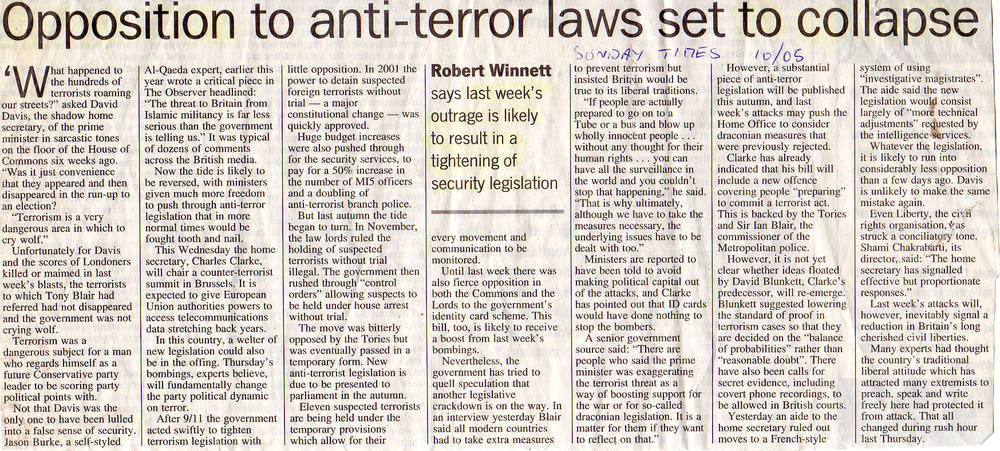
[Classic headline for a False flag operation, in this case 7/7.]
“Terrorism is a very dangerous area in which to cry wolf.”
Unfortunately for Davis and the scores of Londoners killed or maimed in last week’s blasts, the terrorists to which Tony Blair had referred had not disappeared and the government was not crying wolf.
Terrorism was a dangerous subject for a man who regards himself as a future Conservative party leader to be scoring party political points with.
Not that Davis was the only one to have been lulled into a false sense of security. Jason Burke, a self-styled Al-Qaeda expert, earlier this year wrote a critical piece in The Observer headlined: “The threat to Britain from Islamic militancy is far less serious than the government is telling us.” It was typical of dozens of comments across the British media.
Now the tide is likely to be reversed, with ministers given much more freedom to push through anti-terror legislation that in more normal times would be fought tooth and nail.
This Wednesday the home secretary, Charles Clarke, will chair a counter-terrorist summit in Brussels. It is expected to give European Union authorities powers to access telecommunications data stretching back years.
In this country, a welter of new legislation could also be in the offing. Thursday’s bombings, experts believe, will fundamentally change the party political dynamic on terror.
After 9/11 the government acted swiftly to tighten terrorism legislation with little opposition. In 2001 the power to detain suspected foreign terrorists without trial — a major constitutional change — was quickly approved.
Huge budget increases were also pushed through for the security services, to pay for a 50% increase in the number of MI5 officers and a doubling of anti-terrorist branch police.
But last autumn the tide began to turn. In November, the law lords ruled the holding of suspected terrorists without trial illegal. The government then rushed through “control orders” allowing suspects to be held under house arrest without trial.
The move was bitterly opposed by the Tories but was eventually passed in a temporary form. New anti-terrorist legislation is due to be presented to parliament in the autumn.
Eleven suspected terrorists are being held under the temporary provisions which allow for their every movement and communication to be monitored.
Until last week there was also fierce opposition in both the Commons and the Lords to the government’s identity card scheme. This bill, too, is likely to receive a boost from last week’s bombings.
Nevertheless, the government has tried to quell speculation that another legislative crackdown is on the way. In an interview yesterday Blair said all modern countries had to take extra measures to prevent terrorism but insisted Britain would be true to its liberal traditions.
“If people are actually prepared to go on to a Tube or a bus and blow up wholly innocent people . . . without any thought for their human rights . . . you can have all the surveillance in the world and you couldn’t stop that happening,” he said. “That is why ultimately, although we have to take the measures necessary, the underlying issues have to be dealt with too.”
Ministers are reported to have been told to avoid making political capital out of the attacks, and Clarke has pointed out that ID cards would have done nothing to stop the bombers.
A senior government source said: “There are people who said the prime minister was exaggerating the terrorist threat as a way of boosting support for the war or for so-called draconian legislation. It is a matter for them if they want to reflect on that.”
However, a substantial piece of anti-terror legislation will be published this autumn, and last week’s attacks may push the Home Office to consider draconian measures that were previously rejected.
Clarke has already indicated that his bill will include a new offence covering people “preparing” to commit a terrorist act. This is backed by the Tories and Sir Ian Blair, the commissioner of the Metropolitan police.
However, it is not yet clear whether ideas floated by David Blunkett, Clarke’s predecessor, will re-emerge. Blunkett suggested lowering the standard of proof in terrorism cases so that they are decided on the “balance of probabilities” rather than “reasonable doubt”. There have also been calls for secret evidence, including covert phone recordings, to be allowed in British courts.
Yesterday an aide to the home secretary ruled out moves to a French-style system of using “investigative magistrates”. The aide said the new legislation would consist largely of “more technical adjustments” requested by the intelligence services.
Whatever the legislation, it is likely to run into considerably less opposition than a few days ago. Davis is unlikely to make the same mistake again.
Even Liberty, the civil rights organisation, has struck a conciliatory tone. Shami Chakrabarti, its director, said: “The home secretary has signalled effective but proportionate responses.”
Last week’s attacks will, however, inevitably signal a reduction in Britain’s long cherished civil liberties.
Many experts had thought the country’s traditional liberal attitude which has attracted many extremists to preach, speak and write freely here had protected it from attack. That all changed during rush hour last Thursday.
